The Importance of Being Earnest
The irony-poisoned, self-referential popular culture of the 2010s can be traced back to one TV episode. Is it on its way out?
Why do movies feel so different today than forty, twenty, or even ten years ago?
Ever notice how they feel less… serious? Nothing has any dramatic weight? All the characters tend to make jokes as if they’re aware they’re in a movie, even at inappropriate times? We discuss why people are sick of this irony-poisoned style, how movies of the 1990s were different, the one television episode responsible for this movement, and why a big sincerity comeback might be on the horizon!
What’s Wrong With Meta/Self-Referential Humor?
Self-referential humor, at least in the amount we have today, is inherently cynical.
Every time someone watches a movie, television show, plays a video game, or opens a book, a bargain is made: I suspend my disbelief for the allotted time, and in return, you entertain me.
With Star Wars, nobody complains about how ridiculous it is to have telekinetic wizards in bathrobes flying around outer space faster than the speed of light. Nobody cares because we suspend our disbelief. With Friends, we accept that it’s possible for a bunch of 25yos to afford to live alone in multi-bedroom apartments in New York City. With Jurassic Park, we accept that it’s possible to clone dinosaurs.
In Jurassic Park, the scene where they see the dinosaurs for the first time is played completely straight. “They did it… you crazy son of a bitch you did it…” says Jeff Goldblum.
Can you imagine if this scene was written and shot today? Especially if it was Marvel doing it? There would certainly be one character who quips “they look fake” or have another saying “wow, this is just like that Michael Crichton book.”
Self-referential humor is cynical because it’s based on the idea that audiences cannot suspend their disbelief anymore since we’ve already seen everything. If we’re in on all the jokes, storytellers have to be in on it too. No entertainment product is allowed to stand alone on its own merits. Instead, we have to be aware of the greater culture they exist in, and constantly remind audiences of it.
Not only is this cynical, it also undercuts the sole purpose of drama: to entertain people through the power of escapism. Audiences flock to movies to escape the real world for a little while. If we are constantly reminded we’re watching a movie during the movie, our sense of escapism is ruined.
To be fair, it is correct to say that audiences have seen every trope and cliche before. But this has been the case for thousands of years:
All things are wearisome, more than one can say. The eye never has enough of seeing, nor the ear its fill of hearing. What has been will be again, what has been done will be done again; there is nothing new under the sun. Is there anything of which one can say, "Look! This is something new"? It was here already, long ago; it was here before our time.
This is a passage from the Old Testament, one of the oldest works in the Western canon. In another ancient text, Aristotle complains about how some dramas use elaborate sets and costumes to cover up a bad story:
The Spectacle has, indeed, an emotional attraction of its own, but, of all the parts, it is the least artistic, and connected least with the art of poetry. For the power of Tragedy, we may be sure, is felt even apart from representation and actors. Besides, the production of spectacular effects depends more on the art of the stage machinist than on that of the poet.
Let that sink in. In 335 BC, Aristotle might as well have been complaining about CGI and bad writing.
Trying to create a story without tropes or cliches isn’t possible. Tropes and cliches are like notes on a piano, or colors on the color wheel. They are expressions of emotions and experiences that most human beings have in their lives.
But just because it’s impossible to invent new storytelling beats doesn’t mean it’s impossible to tell new stories. In the same way that eight musical notes can be re-arranged in near-infinite combinations, there are an infinite number of stories to be told by rearranging classic ideas.
The Cynicism Shift of the Early 2010s
I enjoy movies from the 1980s and 1990s. Movies from this era (especially towards the nineties) tended to have ridiculous concepts that were taken seriously. Some examples:
Air Force One stars Harrison Ford as U.S. President James Marshall. When Air Force One is taken over by Russian terrorists, the President has to do sneak through the plane, taking out the terrorists one-by-one. It’s a ludicrous concept, but the movie takes it seriously. The idea of the President playing Die Hard is never played for laughs1. There are scenes where Vice President Glenn Close and Defense Secretary Dean Stockwell are monitoring the situation on AF1, earnestly following Marshall’s every move. There is real tension and drama.
Independence Day also has an out-there concept: aliens arrive to Earth, start destroying cities one-by-one, and the U.S. President leads a resistance from Area 51. There are funny moments in the film. In the opening, Will Smith’s character opens his front door, gets his newspaper, completely oblivious to the arrival of the aliens.
But the aliens themselves are never the butt of a joke. Quite the opposite. As soon as Washington, New York, and Los Angeles are destroyed, the film slows down on the jokes, as if the characters understand it’s all real. Characters who make light of the threat are punished or killed, characters who understand its seriousness are rewarded2. The best example of this: in the opening of the film, Randy Quaid’s character (an alcoholic ex-pilot) tells stories of him being abducted and abused by visitors from outer space. He’s made fun of by the other residents of his trailer park. But when the aliens arrive, not only is he vindicated, he winds up saving the day.
True Lies is an outright comedy3. But inside the film’s comedic outer layer is a simple story about a husband (super-spy Harry Tasker, played by Arnold Schwarzenegger) and wife (Helen, Jamie Lee Curtis) trying to reconcile their marriage. The action scenes are played for laughs, but the Arnold-Curtis scenes are played sincerely.
To further illustrate this, let’s compare and contrast The Matrix with the unnecessary sequel made twenty years later.
The Matrix is built around the outlandish idea that the world is a computer simulation, and that there is a dystopian “real world” to wake up to. We are introduced to this concept in the scene where Neo meets Morpheus. Everything about this scene is terrific. The set it lit to make Morpheus look mysterious. We hear the sound of rain and thunder in the background. There are pauses in the dialogue to allow the audience to take in the moment.
Contrast this to Resurrections, where Neo meets Morpheus in the bathroom of his software company.
“At last!” says Morpheus. He then says that the last time they did this, it was in an abandoned mansion at night, but this time, a bathroom will have to do. Neo loses it, manically wagging his finger saying “this can’t be real.”
The scene in Resurrections is the polar opposite of The Matrix in every dimension. The original was lit in darkness, the new one in fluorescent light. The original scene had slow, deliberate pacing, the new one feels rushed. The original scene read as serious. The new one is explicitly silly. Morpheus4 pointing out that they’re meeting in a bathroom turns what should be a critical moment for Neo into a joke.
Emotional Consequences of Broadcast Television
Everyone has noticed the Marvelization of popular culture. In the opening scene of Star Wars: The Force Awakens, Poe Dameron (Oscar Isaac) asks Kylo Sen “so do you talk first or do I talk first?” It’s as if they’ve (1) seen a thousand action movies and (2) are aware they’re in one. This could have been a joke in a Marvel movie.
But Marvel is not the ultimate source of this kind of humor. The first Iron Man was actually a more grounded action-adventure story. There are no quips, no self-aware one-liners. Potts, Rhodes, and Stane all lecture Stark about his puerile behavior throughout the film. Stark’s character arc focuses on him becoming less silly and more mature as he takes on the mantle of a hero.
The ultimate source of Marvelization was not Marvel. It was the cult television show of the 2010s.
Community was an NBC sitcom that ran from 2009 - 2015. Barely anybody watched it. But the people who did watch it tended to be culturally influential — writers for Cracked or The AV Club, screenwriters, actors, directors. Community might not have been your favorite show. But it was your “favorite show’s favorite show.”
The first season of Community was a fairly straightforward story. Jeff Winger (Joel McHale) has been disbarred after his fake law degree was discovered. He then enrolls at a community college. To win over the beautiful Britta Perry (Gillian Jacobs), he founds a study group for Spanish class.
But on May 6, 2010, the show, and popular culture, would be changed forever when Community’s most critically acclaimed episode would air:
“Modern Warfare” was not Community’s first genre parody episode. That title goes to “Contemporary American Poultry,” an episode about a Goodfellas-inspired chicken tender racket. But “Modern Warfare,” inspired by Die Hard and Scarface, would be the bigger hit. It was considered to be one of the best episodes of any television show for the 2009-2010 season.
The rave reviews for “Modern Warfare” would cause the Community writers to do more pop culture parodies. “Basic Rocket Science” would spoof The Right Stuff and Apollo 13. “Epidemiology” would riff on the Romero zombie movies. “Intermediate Documentary Filmmaking” was written and shot like NBC’s own mockumentary comedies The Office and Parks and Rec. “Paradigms of Human Memory” was a clip show… but none of the clips were from previous episodes. The two part “Paintballs” finale of S2 would cover Clint Eastwood westerns and Star Wars.
By the time of the show’s final season, it stopped parodying other shows and started parodying itself. The characters were nearly aware they were in a TV show. In the fifth season finale, Abed said that if the study group didn’t reconvene the next year, it would be because an asteroid wiped out all life on Earth, “and that’s canon.”
Although the show had low ratings, Community’s alumni went on to do bigger projects.
Donald Glover, doing business as Childish Gambino, needs no elaboration.
Jim Rash (Dean Craig Pelton) won an Oscar for screenwriting.
Showrunner Dan Harmon co-created Rick and Morty.
John Oliver (Ian Duncan) would get a weekly HBO show.
Alison Brie (Annie Edison) was in Promising Young Woman.
And finally, show directors Joe and Anthony Russo would go on to direct Avengers: Endgame.
I was a fan of Community when it aired, and I still consider myself a fan of the show. I would go so far as to label Community the first victim of Marvelization. I enjoyed the original show about the slimy lawyer trying to get the hippie girl more than the zany parody of the week show.
Marvel, and the rest of pop culture with it, would follow Community when the Russo brothers entered the driver’s seat for the largest entertainment franchise in the world.
Their first foray into the MCU was Captain America: The Winter Soldier. To my knowledge, this is the first Marvel movie that toyed with self-referential humor. Future movies would up the ante. By the time of Avengers: Infinity War, Peter Parker would ask Tony Stark if he’d ever seen the movie Aliens, and the two then blow Thanos’s top henchman into the vacuum of space.
The Importance of Being Earnest
Top Gun: Maverick, as of this writing, looks to be the big hit of the year. The only movie that has a chance of beating it out at the 2022 box office is Avatar: The Way of Water.
Why was it such a hit? I don’t think “woke-ness” had much to do with it, despite the speculation of some in the conservative press. Maverick wasn’t “woke,” but it’s not a conservative movie, either. Furthermore, I’d assert that Maverick goes beyond apolitical and enters the realm of the anti-political.
Top Gun: Maverick broke the record for the Memorial Day box office for a simple reason: it looked cool! Tom Cruise is cool, fighter jets are cool, and beach volleyball is cool. But audiences kept coming back again and again because Maverick actually tells a human story, and does so sincerely.
The script is tight and insular. It’s a simple story with two goals: repair the relationship with Goose’s son, and stop The Enemy from building nuclear weapons.
There’s no cinematic universe to keep track of. There are no “meta” quips. Nobody breaks tension with a joke after a character death or other moment. Maverick is a favorable environment for escapism. You don’t need to think about or remember any other popular culture except the original film.
Some characters are serious (the admiralty), some characters are funnier (Hangman the hotshot and Bob the weapons officer), and some characters are in between (Maverick). Just like real life, where people come on a spectrum ranging from stone-cold to class-clown. Compare and contrast to Marvel films, where every character has to be making zingers like they’re watching a movie in Mystery Science Theater 3000.
Like the blockbusters of the 1990s, there are moments in Maverick that are actually very sweet and sincere. These include:
The scene where Penny Benjamin teaches Maverick how to sail. “Now, you’re in the Navy,” she says when he raises the second sail and takes the wheel.
The Val Kilmer scene, which doesn’t need much elaboration.
On the carrier deck, after Maverick and Rooster land their stolen F-14. Maverick thanks Rooster for saving his life, and gives him a bear hug. And my favorite line of dialogue in the movie: Hangman brags about his second air-to-air kill. “Maverick has five,” Phoenix reminds him. “That makes him an ace.”
Big Sincerity Comeback Soon?
What made the first Iron Man work well is that Tony Stark was a silly character in a serious world. When you have silly characters in a silly world, it doesn’t work because there are no stakes or tension. Even comedies don’t do this. Usually, at least one character is the “straight man” to make a contrast to the funnier ones.
Are audiences finally sick of the “cynical silliness” overload? I think so. Thor: Love and Thunder made $144M in its opening weekend, and suffered a 68% drop in its second. Rotten Tomatoes’s consensus indicates that “the constant silliness makes it hard to invest in the more serious sides of the story.”
Cultural trends are cyclical, and can change rapidly. Fashion is the best example of this. I’m confident that cynical, self-referential pop culture is in retreat, and sincerity is poised to make a huge comeback, especially as the pandemic retreats into memory. Two recent TV shows, Ted Lasso and This Is Us, have been big hits precisely because of their sincere, uplifting tone.
Self-referential meta storytelling will never, nor should it. Storytelling has been part of the human experience since cave paintings and campfires. Movies will still contain winks and nods to the audience, but will be a little more subtle about it. A good example of this… Top Gun: Maverick.
In Maverick, there is a scene where Admiral Ed Harris dresses down Pete “Maverick” Mitchell — who may as well be called Tom “Maverick” Cruise. Maverick is characterized as the last of his kind, a pilot who has the right stuff. Many have wondered if Tom Cruise is the last of the movie stars.
“Your time is almost up, Maverick,” says Harris. “One day, we won’t need pilots to fly planes anymore.”
“Maybe so, sir,” responds Maverick. “But not today.”
The closest we get to playing the concept for laughs is when Ford dials the White House. The switchboard operator thinks it’s a prank call, until she traces it.
More examples: Will Smith says he “can’t wait to whoop E.T’s ass” and crashes his plane in the desert. Jeff Goldblum, frantically trying to convince everyone of impending doom, gets to escape on Air Force One. The stripper who attends the welcome wagon rally in downtown Los Angeles gets killed when LA is destroyed.
This is a great movie, by the way. I love the story structure. Act I: super secret agent missions. Act II: abusing U.S. taxpayer resources to get even with your wife. Act III: fucking up Florida with Harrier jets.
Why would they recast Morpheus?!?!?! He was the coolest one

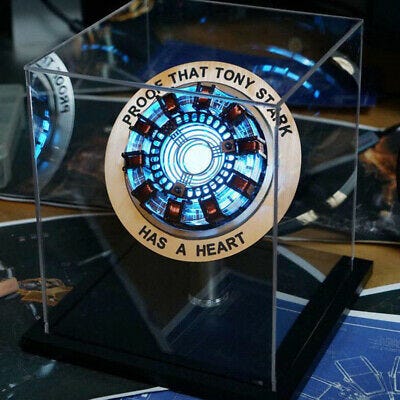
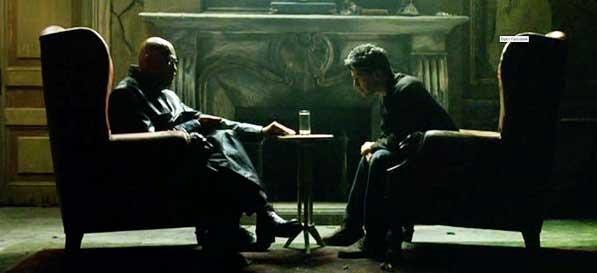
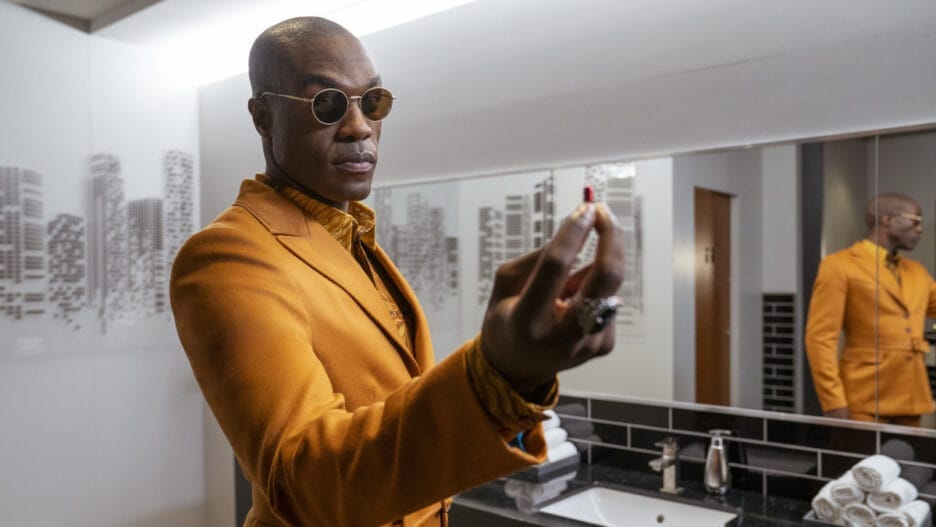
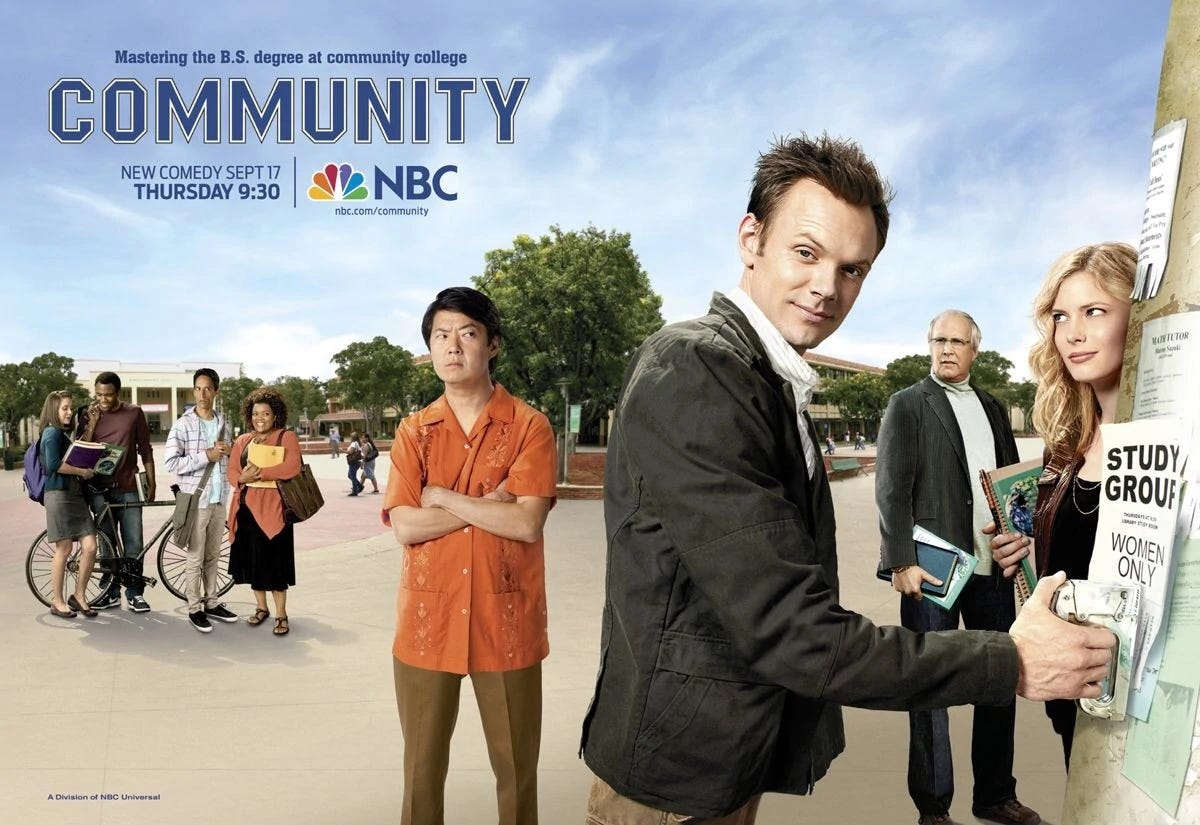
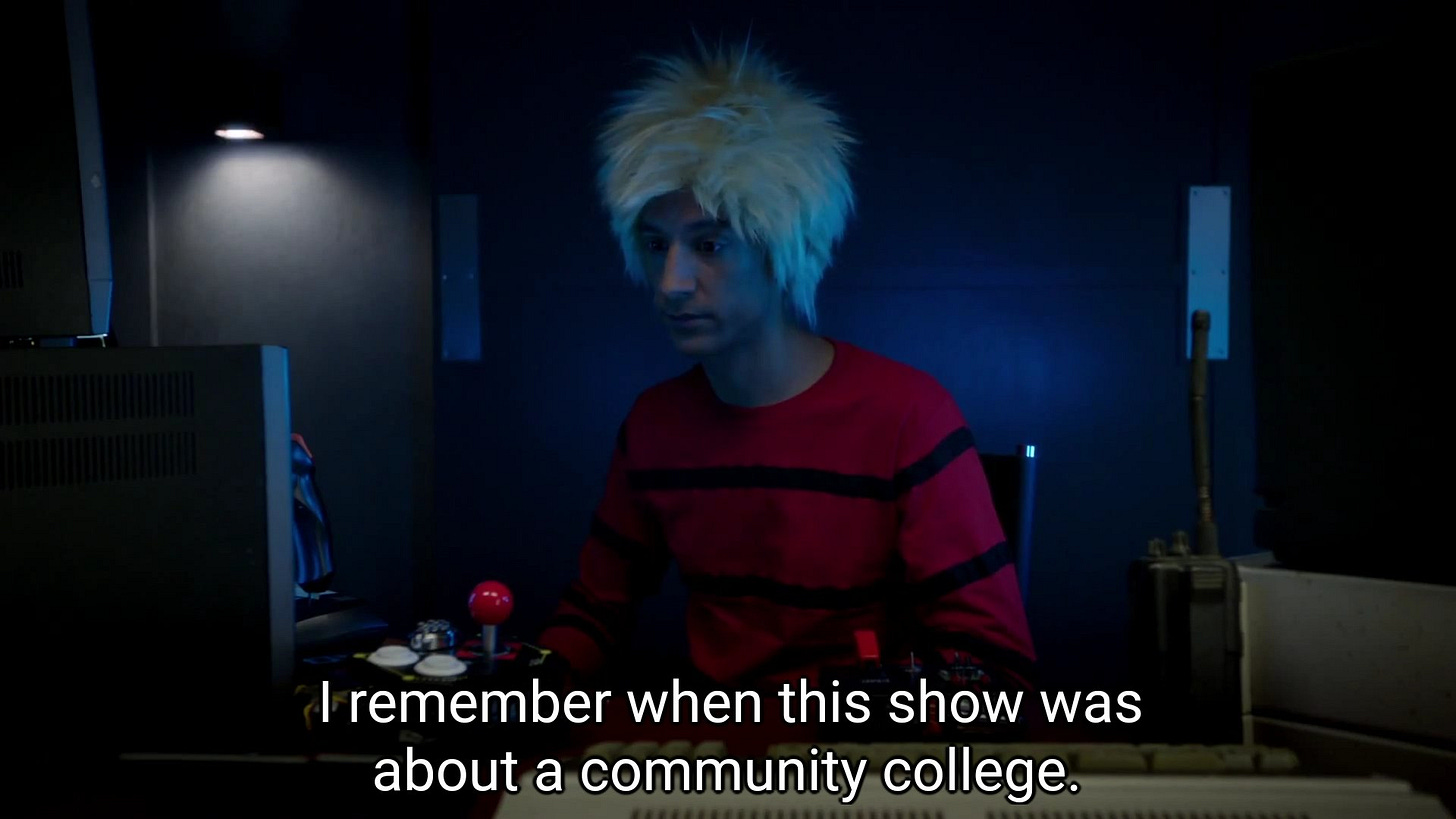

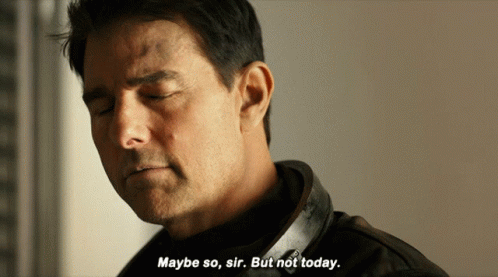
As someone who works in Hollywood, I can attest that most of the people working in Hollywood are frauds and have no respect for the history of Hollywood, nor great films. It’s all product to them, filler like mortar between bricks devoid of any substance.
Once in awhile a good movie slips through the cracks, but with the radical Marxist “woke” regimen that has seized Hollywood that will become an increasingly rare event. Great art has never been made when it forced to adhere to a radical ideology.
It is a far cry from old Hollywood in which Republicans and Democrats worked together to make great art, and, even if they differed politically, respected one another artistically. They didn’t allow radical ideology to stand in the way of telling a great story. Now Republicans are under siege and are like Christians in Ancient Rome afraid of being thrown to the lions.
As for Maverick - it is a pastiche with mediocre, first level direction, and a thousand missed opportunities. Too many to go into here. People are so desperate for a movie that still respects our military and America that they made it a hit. It doesn’t hold up to Top Gun at all in any way, and missed important elements that would have made this a classic.
There’s much more I could expose in an article so I will limit myself to these observations.
no movie under twenty years old is worth split.